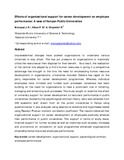Effects of organizational support for career development on employee performance: A case of Kenyan Public Universities
Abstract
Unprecedented changes have pushed organizations to undertake various
initiatives to stay afloat. This has put pressure on organizations to maximally
utilize the resources at their disposal for their benefit. As a result, the realization
of the central role played by a firm's human resources in giving it a competitive
advantage has brought to the fore the need for emphasizing human resource
development in organizations, universities included. Debate has raged on the
party responsible for career development programmes. Whereas individual
employees have initiated and funded such processes, consensus has been
building on the need for organizations to take a prominent role in initiating,
managing and enhancing such processes. This study sought to examine the effect
of university support for career development on lecturers' performance in public
universities. Guided by the psychological contract theory, data was collected from
328 academic staff drawn from all the public universities in Kenya using
questionnaires. It was analyzed using descriptive statistics and hypotheses tested
using Pearson Product moment correlation coefficient. The results indicated that
organizational support for career development of employees positively affected
their performance in public universities. This support in terms of study leave,
financial support for further studies as well as incentives such as salary increases
and promotions on completion of such programmes enhanced organizational
citizenship hence improved employee performance.

